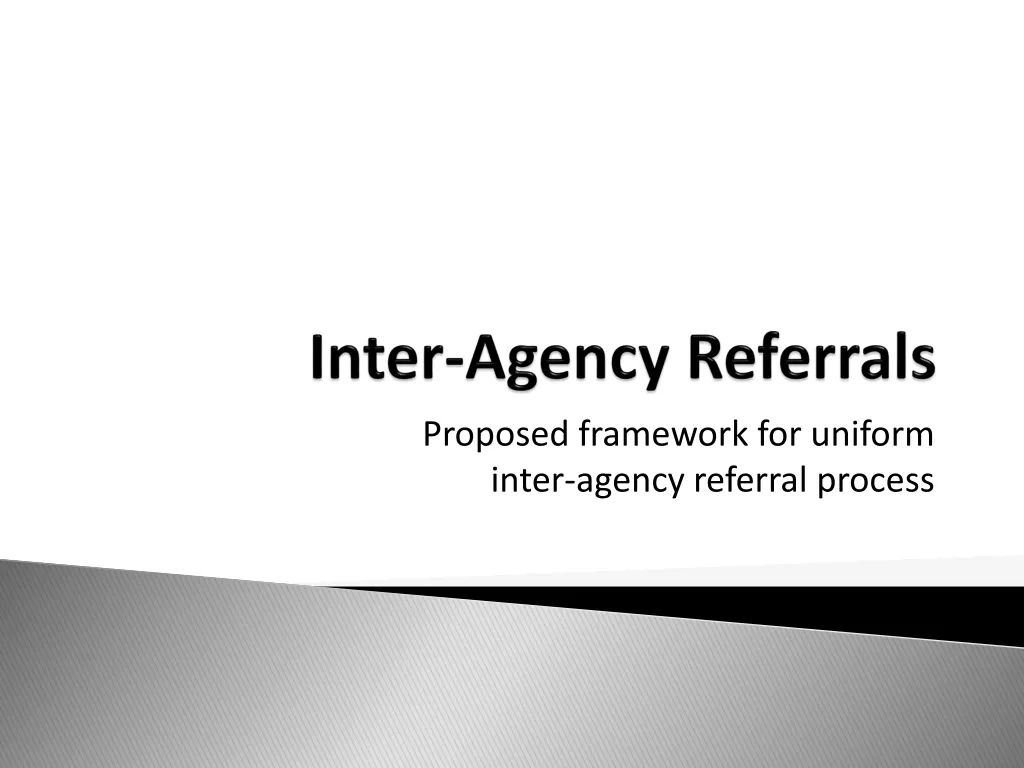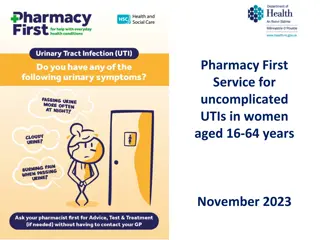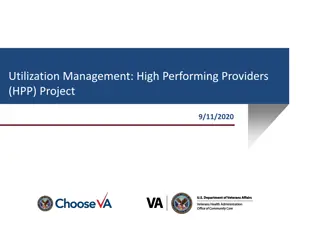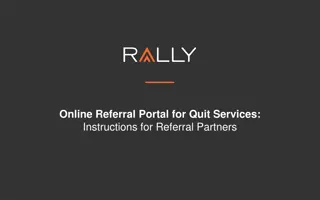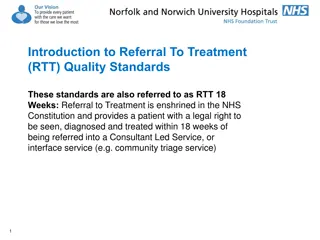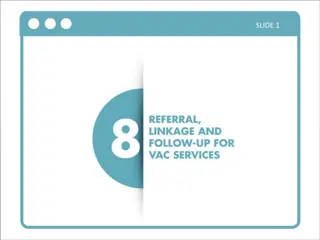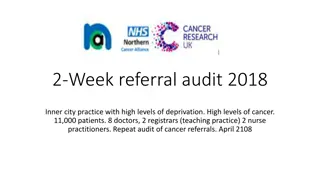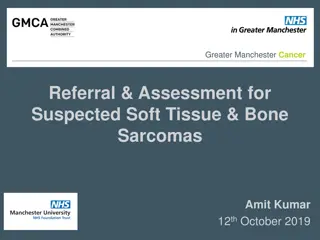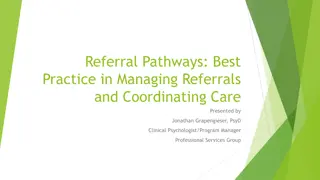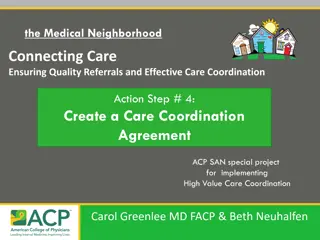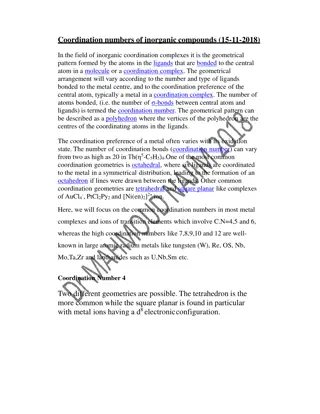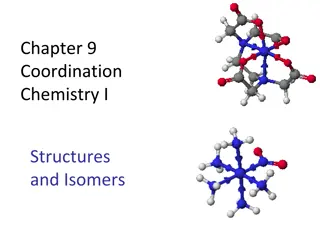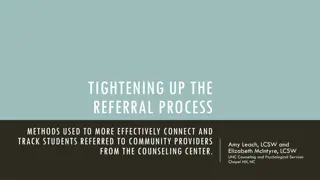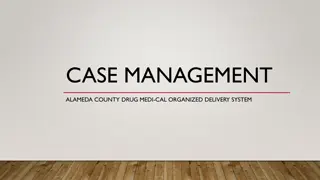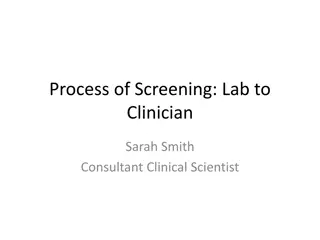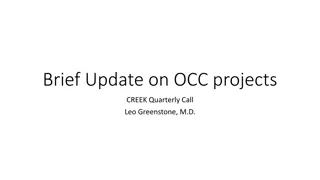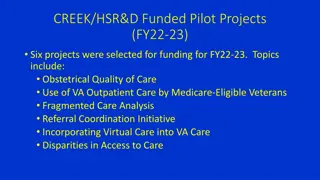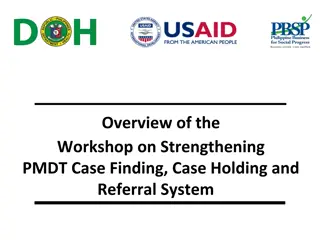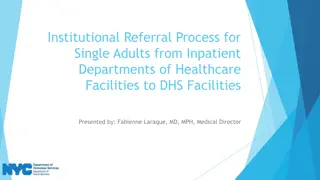
High Value Referral Process for Effective Care Coordination
Establishing a high value referral process is crucial for ensuring quality care coordination in a medical neighborhood. This involves defining key elements of a referral request, establishing referral criteria and guidelines, and implementing a pre-consultation review process. By following these action steps, healthcare providers can streamline referrals, enhance communication among practices, and ultimately improve patient outcomes.
Download Presentation

Please find below an Image/Link to download the presentation.
The content on the website is provided AS IS for your information and personal use only. It may not be sold, licensed, or shared on other websites without obtaining consent from the author. If you encounter any issues during the download, it is possible that the publisher has removed the file from their server.
You are allowed to download the files provided on this website for personal or commercial use, subject to the condition that they are used lawfully. All files are the property of their respective owners.
The content on the website is provided AS IS for your information and personal use only. It may not be sold, licensed, or shared on other websites without obtaining consent from the author.
E N D
Presentation Transcript
the Medical Neighborhood Connecting Care Ensuring Quality Referrals and Effective Care Coordination Action Step #2: Ensure you get what you need for a high value referral ACP SAN special project for implementing High Value Care Coordination Carol Greenlee MD FACP
Action Steps to Connected Care A. Look at your internal referral process (get your own house in order) B. Ensure you get what you need for a high value referral C. Ensure others get what they need D. Develop Care Coordination Agreement(s) (compact) with appropriate referring practice(s) 2. Referral Criteria/ Guidelines Risk Stratify Urgency Pertinent Data Set (Referral Guidelines) Three (3) Action Items to Establish: 1. Basic Elements of a Referral Request 2
1st Define the Basic Elements of the Referral Request Check list for a high value Referral Request Patient Demographics & Scheduling Information Referral Information Patient s Core Data Set Care Coordination/Referral Tracking 3
Referral Information What is the specific clinical question (reason for referral) A brief Summary of case details pertinent to the referral, include relevant co-morbidities (alarm signs or symptoms) Urgency (referral status or referral priority) Referral Type (anticipated, pending specialist s evaluation) (Referral Definition or Role in care requested of the specialist) Pertinent data set: Clinical information directly relevant to the specific referral question (office notes, test results, etc.) (Supporting data for the referral) 4
2nd Establish Referral Criteria / Guidelines Timing of the referral request and appointment urgency or priority for scheduling expectations - urgent, intermediate/move up and routine ( risk stratification of the referral needs ) Supporting data needed for the particular referral condition pertinent data sets / referral guidelines for referral conditions 5
Action Steps to Connected Care A. Look at your internal referral process (get your own house in order) B. Ensure you get what you need for a high value referral C. Ensure others get what they need D. Develop Care Coordination Agreement(s) (compact) with appropriate referring practice(s) Risk Stratify Urgency Pertinent Data Set (Referral Guidelines) 3. Pre-consultation/ Pre-visit review process Three (3) Action Items to Establish: 1. Basic Elements of a Referral Request 2. Referral Criteria/ Guidelines 6
the Medical Neighborhood Connecting Care Ensuring Quality Referrals and Effective Care Coordination Delmarva Webinar 3 (action step 2, segment 3) Establish a Pre-consultation Process ACP SAN special project for implementing High Value Care Coordination Carol Greenlee MD FACP
As you listen Think about how investing in a Pre-consultation (Pre-visit review and assistance) process could make the referral process more patient-centered at the same time save time & effort (resources) for the practice. Think about how you can re-organize for a Pre- consultation process with pre-visit preparation & assistance to replace chaos at time of appointment & the back-end burden 8
Antithesis of High Value Coordinated Care: Antithesis of High Value Coordinated Care: Common scenario #1: 60 yo woman was referred to surgeon Dr. Z by another specialist for a procedure. After a 3 month wait for the appointment, Surgeon Z. read her records as he walked in the room saying I don t do that procedure. You will need to go to XXX Clinic to get that done . Waste: Delay: Progression of condition, harm Non-value-added appointment for all in involved 9
Antithesis of High Value Coordinated Care: Antithesis of High Value Coordinated Care: Common scenario #2: 70 year old woman does not know why she was referred, PCP staff just told her to make appt, no records, only get into voice mail at PCP office Waste: Resources (duplicated testing, visit costs, time) Access jammed up (delay of care downstream effects) 10
What is Pre-consultation? A request for pre-visit advice and/ or assistance Should not require in-depth analysis of the case Can result in no need for further assessment or management Can evolve into an e-consult or face-to-face appointment A process of pre-visit review To ensure appropriateness of the referral To ensure adequacy of the referral information To provide advice or assistance as needed for preparation for the referral appointment and interim care Additional testing Therapeutic trial Interim care to stabilize while waiting for specialty care 12
Pre-consultation Request for Pre-visit Advice and/or Assistance Pre-visit preparation or assistance can take place before any type of formal referral & can include: request for guidance regarding whether referral is appropriate and/or necessary Request for guidance on the urgency of the referral Request for guidance for pre-visit work-up. Through these interactions, patient care is optimized and cooperation & an educational process around that care occurs between the practices 13
I am referring this patient for: ___Pre-consultation/ pre-visit assistance/preparation ___Medical Consultation: Evaluate and advise with recommendations for management and send back to me ___Procedural Consultation: Specialist to confirm need for and perform requested procedure if deemed appropriate. ___Co-management: I prefer to share the care for the referred condition (PCP lead, first call) ___Co-management: Please assume principal care for the referred condition: (Specialist assumes care, first call) ___Please assume full responsibility for the care of this patient (Complete transfer of care) 14
Examples of Pre-consultation requests: Are these slightly abnormal thyroid function studies of concern? Do they need further evaluation? If so, what additional testing do you want before the appointment For referral to Nephrology for new patient evaluation for renal dysfunction, patient has had an Abdominal CT scan, Does patient still need Renal US before you will schedule? Receive photo of skin lesion with referral rule out melanoma Review by dermatology identifies it as benign (e.g. seborrheic keratosis); requesting practice notified & patient receives reassurance (no dermatology appointment needed) 15
Response to a Pre-consultation Request Clinician involvement is critical Can indicate No need for further assessment or treatment Need for a different specialty type Need for additional testing or therapeutic trial prior to referral Need for formal referral appointment Simple issues amenable to recommendations per e- consult (virtual consultation clinician-to-clinician) Can send response by faxed note (or even phone call) if shared or interoperable EMR is not available 16
Pre-consultation Review(working the referral) Recommended for all referral requests Review prior to scheduling patient To ensure appropriate referral Determine urgency of the referral Ensure adequate information for high value referral Can be a team process (with clinician oversight & availability) Use of referral request checklist Use of lists of urgent-intermediate-routine conditions Use of referral guidelines/ pertinent data sets Clinician review of outlier or complex cases 17
How do you request missing information? Phone call to requesting practice Forms Tracking system to ensure receive It s worth the investment in time & effort up front to prevent the chaos & disruption and back-end mess & burden 18
Pre-consultation/ Pre-visit Review Check-list Identify if referral is to appropriate specialty If referred condition is better managed by a different specialty: what process do you use to redirect the referral? Who notifies the patient? Identify if referral appointment is needed (indicated) If further evaluation or management is not indicated Explain why not indicated (e.g. thyroid nodule guidelines or .) Answer simple question that does not require formal consultation (e.g. this does not require any treatment ) Who notifies & explains to patient? Need to know that referring practice has process for handling 19
Pre-consultation/ Pre-visit Review Check-list Are the referral request elements complete? Is the clinical question clear Is there adequate & pertinent supporting data (pertinent date set) Is the Core Medical Data set included What is the urgency (risk stratification) of the referral needs? Is the patient scheduled according to those needs 20
Pre-consultation/ Pre-visit Review Improves value of appointment for patients Creates more time for interaction with the patient around the reason for referral or the clinical question Improves resource utilization by both requesting & responding practices Reduces stress and increases cooperation around caring for the patient Improves access Improves safety Reduces waste 21
Antithesis of High Value Coordinated Care: Antithesis of High Value Coordinated Care: Common scenario #1: 60 yo woman was referred to surgeon Dr. Z by another specialist for a procedure. After a 3 month wait for the appointment, Surgeon Z. read her records as he walked in the room saying I don t do that procedure. You will need to go to XXX Clinic to get that done . This patient (and clinician) would have benefited from a Pre-consultation Request Do you do this procedure? Or at least a Pre-consultation review to catch the inappropriate referral 22
Antithesis of High Value Coordinated Care: Antithesis of High Value Coordinated Care: Common scenario #2: 70 year old woman does not know why she was referred, PCP staff just told her to make appt, no records, only get into voice mail at PCP office This patient (and clinician) would have benefited from a Pre-consultation Review to request the missing clinical question and supporting data 23
Put it into action. For Primary Care Consider a Pre-consultation Request for patients you need guidance on preparation for referral or if not sure about need for referral, type of specialty or timing For Specialty Care As you develop your Pre-consultation review process Use the Referral Request checklist Use the urgency / priority lists Use the Pertinent Data Sets / Referral guidelines 24
Leave in action. For Primary Care Use Pre-consultation Requests to ensure high value referral requests For Specialty Care Develop a Pre-consultation process & checklist For responding to Pre-consultation Requests For doing Pre-consultation Reviews of all referral requests 25
www.acponline.org/hvcc-training Pre-consultation Review process checklist 26

